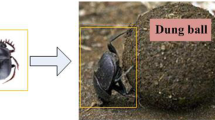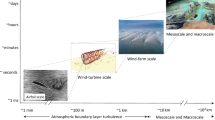Abstract
The water wave optimization (WWO) based on shallow water wave theory is a new nature-inspired optimization algorithm that imitates wave motion to solve optimization problems. But basic WWO has some disadvantages, such as low calculation accuracy and falling easily into the local optimum. The WDO based on the motion of air parcels in the wind mainly imitates the process of air pressure balance such that different air pressure in different regions leads to air flow. The WDO demonstrates strong global search ability in the entire search space. To improve the optimization performance of WWO and avoid premature convergence, the velocity of WDO is introduced into the propagation operation, which quickens water wave motions to determine the global optimal solution. In this paper, the wind-driven WWO (WDWWO) algorithm is proposed, which not only achieves complementary advantages, but also balances exploration and exploitation. Sixteen benchmark test functions were used to detect calculation accuracy of WDWWO. To verify the robustness and effectiveness of WDWWO, it was applied to solve three engineering design problems. The experimental results reveal that the proposed algorithm is able to solve challenging engineering optimization problems and is a very competitive algorithm as compared with other optimization algorithms.










Similar content being viewed by others
References
Karaboga D, Basturk B (2007) A powerful and efficient algorithm for numerical function optimization: artificial bee colony (ABC) algorithm. J Glob Optim 39(3):459–471
Yang XS, Deb S (2010) Cuckoo search via Lévy flights. World Congress on Nature and Biologically Inspired Computing 71(1):210–214
Mirjalili S (2016) Dragonfly algorithm: a new meta-heuristic optimization technique for solving single-objective, discrete, and multi-objective problems. Neural Comput and Applic 27(4):1053–1073
Mirjalili S (2015) Moth-flame optimization algorithm: a novel nature-inspired heuristic paradigm. Knowl-Based Syst 89:228–249
Zheng YJ (2015) Water wave optimization: a new nature-inspired metaheuristic. Comput Oper Res 55:1–11
Bayraktar Z, Komurcu M, Werner DH (2010) Wind driven optimization (WDO): a novel nature-inspired optimization algorithm and its application to electromagnetics. In: Antennas and propagation society international symposium. IEEE, pp 1–4
Yang XS, Gandomi AH (2012) Bat algorithm: a novel approach for global engineering optimization. Eng Comput 29(5):464–483
Yang XS (2012) Flower pollination algorithm for global optimization. In: International conference on unconventional computation and natural computation, vol 7445. Springer, pp 240–249
Kennedy J, Eberhart R (2002) Particle swarm optimization. IEEE Int Conf Neural Netw 4(8):1942–1948
Mirjalili S (2016) SCA: a sine cosine algorithm for solving optimization problems. Knowl-Based Syst 96:120–133
Askarzadeh A (2016) A novel metaheuristic method for solving constrained engineering optimization problems: crow search algorithm. Comput Struct 169:1–12
Michalewicz Z (1996) Genetic algorithms + data structures = evolution programs. Comput Statist Data Anal 24(3):372–373
Yang XS (2013) Multiobjective firefly algorithm for continuous optimization. Eng Comput 29(2):175–184
Zhang B, Zheng YJ (2016) Convergence analysis of water wave optimization algorithm. Computer Science
Wu X, Zhou Y, Lu Y (2017) Elite opposition-based water wave optimization algorithm for global optimization. Math Probl Eng 11:1–25
Zhang B, Zhang MX, Zhang JF, Zheng YJ (2015) A water wave optimization algorithm with variable population size and comprehensive learning. In: International conference on intelligent computing. Springer, Cham, pp 124–136
Zheng YJ, Zhang B (2015) A simplified water wave optimization algorithm. In: Evolutionary computation. IEEE, pp 807–813
Wu XB, Liao J, Wang ZC (2015) Water wave optimization for the traveling salesman problem. In: International conference on intelligent computing. Springer, Cham, pp 137–146
Kilany M, Hassanien AE, Badr A (2016) Accelerometer-based human activity classification using water wave optimization approach. In: Computer engineering conference. IEEE, pp 175–180
Zhou Y, Bao Z, Luo Q, Zhang S (2017) A complex-valued encoding wind driven optimization for the 0-1 knapsack problem. Appl Intell 46(3):684–702
Hansen N, Auger A, Finck S, Ros R (2010) Real-parameter black-box optimization benchmarking 2009: experimental setup. HAL-INRIA 16(731):185–193
Molina D, Lozano M, Herrera F (2009) A study on the use of non-parametric tests for analyzing the evolutionary algorithms’ behaviour: a case study on the CEC’2005 special session on real parameter optimization. J Heuristics 15(6):617–644
Mirjalili S (2015) The ant lion optimizer. Adv Eng Softw 83(C):80–98
Mirjalili S, Mirjalili SM, Hatamlou A (2016) Multi-verse optimizer: a nature-inspired algorithm for global optimization. Neural Comput and Applic 27(2):495–513
Coello CAC (2000) Use of a self-adaptive penalty approach for engineering optimization problems. Comput Ind 41(2):113–127
Gandomi AH, Yang XS, Alavi AH (2013) Cuckoo search algorithm: a metaheuristic approach to solve structural optimization problems. Eng Comput 29(1):17–35
Rashedi E, Nezamabadi-Pour H, Saryazdi S (2009) GSA: a gravitational search algorithm. Elsevier Science Inc 4(6):390–395
Coello CAC, Montes EM (2002) Constraint-handling in genetic algorithms through the use of dominance-based tournament selection. Adv Eng Inform 16(3):193–203
Kannan BK (1994) An augmented lagrange multiplier based method for mixed integer discrete continuous optimization and its applications to mechanical design. J Mech Des 116(2):405–411
Sandgren E (1990) Nonlinear integer and discrete programming in mechanical design optimization. J Mech Des 112(2):223–229
Lee KY, Park YM, Ortiz JL (2010) A united approach to optimal real and reactive power dispatch. IEEE Power Eng Rev PER-5(5):42–43
Varadarajan M, Swarupa KS (2008) Differential evolution approach for optimal reactive power dispatch. Appl Soft Comput 8(4):1549–1561
Sulaiman MH, Mustaffa Z, Mohamed MR, Aliman O (2015) Using the gray wolf optimizer for solving optimal reactive power dispatch problem. Appl Soft Comput 32(C):286–292
Ghasemi M, Taghizadeh M, Ghavidel S (2015) Solving optimal reactive power dispatch problem using a novel teaching–learning-based optimization algorithm. Eng Appl Artif Intel 39:100–108
Mouassa S, Bouktir T, Salhi A (2017) Ant lion optimizer for solving optimal reactive power dispatch problem in power systems. Eng Sci Technol Int J 20(3):885–895
Acknowledgments
This work was supported by the National Science Foundation of China under Grant Nos. 61463007, 61563008 and Project of the Guangxi Natural Science Foundation under Grant No. 2016GXNSFAA380264.
Author information
Authors and Affiliations
Corresponding author
Rights and permissions
About this article
Cite this article
Zhang, J., Zhou, Y. & Luo, Q. Nature-inspired approach: a wind-driven water wave optimization algorithm. Appl Intell 49, 233–252 (2019). https://doi.org/10.1007/s10489-018-1265-4
Published:
Issue Date:
DOI: https://doi.org/10.1007/s10489-018-1265-4




